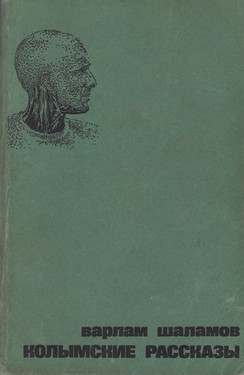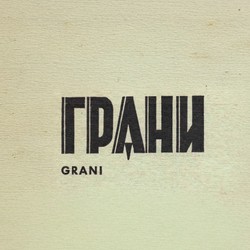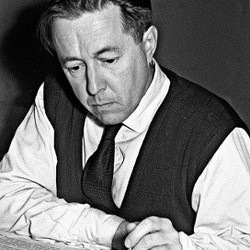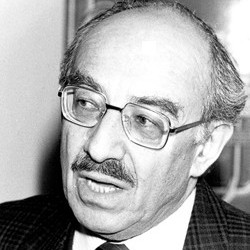Не озаботился поставить вопрос о выживании и ответить на него и В. Шаламов в его «Колымских рассказах», хотя, вместе с тем, ответ в его рассказах есть, но не собранный, не подчеркнутый, – как будто «разоблачать» зло (в самих себе?) куда проще и интересней. Интересность и делает так, что, если не говорить о «законе выживания», страшилище коммунистического террора выходит все же односторонним.
Рассказы Шаламова о Колымских лагерях в конце прошлого года вышли отдельной книгой в Англии на русском языке.* Об этом издании, на мой взгляд, необходимо высказать несколько замечаний.
Прежде всего, о самой книге, ее формате: книга представляет собой увесистый булыжник. Издание за рубежом русских книг, главный читатель которых в России, мы всегда рассматривали и с точки зрения отправки за «железный занавес». В этом отношении «Колымские рассказы» изданы крайне неудачно: книга с короткими страницами (всего их 896) получилась, как тяжелый ком. А если бы дать страницы обычного книжного формата, она стала бы вдвое тоньше, что удобнее для отправки в «отечество всех трудящихся».
Может быть, автор хотел, чтобы в книгу вошло все, написанное им о Колыме, – издатель так и сделал. Наряду с законченными рассказами и очерками в книгу вошли и краткие, в страницу и полторы, записи, мало что говорящие о лагере и часто не имеющие ни художественной, ни познавательной ценности. Есть и прямые повторения. Так, рассказ «Последний бой майора Пугачева» целиком включен в растянутый очерк «Зеленый прокурор», где персонажам только даны другие имена. Зачем нужно это дублирование? Для увеличения объема книги?
На обороте титульного листа есть заметка, от издательства, что «некоторые из этих рассказов были напечатаны…». Надо уточнить: в книге 103 рассказа. Из них 15 были напечатаны ранее в журнале «Грани» и 47 рассказов – в «Новом Журнале». Иначе говоря, не «некоторые», а больше половины всех рассказов. Если бы было не так, откуда зарубежный читатель узнал бы о Шаламове-прозаике и оценил его талант? Я знаю ряд поэтов и писателей зарубежья, которые давно высоко оценили талант Шаламова, – они могли это сделать только по рассказам в «Новом Журнале» и «Гранях».
Предисловие написано М. Геллером, – литературно очень грамотно, пожалуй, и очень панегирично [sic!], может быть, по правилу, что кашу маслом не испортишь. Но первая же фраза вызывает досаду: «Трагическая судьба русских писателей не удивляет уже давно. Она стала как бы их предназначением», – так и просится волошинское: «Неисповедимый рок ведет / Пушкина под дуло пистолета / Достоевского на эшафот…». К чему однако эта никак не оправданная здесь реминисценция? Другая эпоха, другие причины, другие люди… Или и здесь: попривычнее, от Ивана Грозного, постандартнее?
Геллер привел мнение Солженицына, высоко оценившего «Колымские рассказы». Но забыл о порицании или осуждении им Шаламова, когда за подписью последнего в «Литературной газете» было напечатано, что рассказы его о Колыме были написаны давно, они давно не актуальны и больше таких он не пишет. Если забывать о высказывании Солженицына по этому поводу, то опять получится по Пруткову – подобно флюсу.
Вернемся к «закону выживания». Рассказ «Экзамен» Шаламов начинает так: «Я выжил, вышел из Колымского ада потому, что стал медиком, кончил фельдшерские курсы в лагере, сдал государственный экзамен. Но раньше… был другой экзамен – приемный, более важный», – его автор не выдержал, но на курсы все же был принят.
Автор совсем не знал химию. Преподавателя химии у них в Вологде в 18-м году расстреляли и химию поэтому им не преподавали. Экзаменатор – академик, заключенный. Спросил формулу гипса, автор ответил: «Не знаю. – Академик остолбенел». Формулу извести? Тоже не знаю. Академик заподозрил неслыханную дерзость, он и позже считал эти ответы «личным оскорблением деятеля науки», – он ведь не знал, почему автор химию не учил, а сказать ему об этом автор видимо не решился. По другим предметам у автора были пятерки, академик видел, что перед ним интеллигентный человек – он поставил ему тройку и тем автора спас.
Как видим, вполне в стиле «приткнись», – Шаламов однако пишет об академике неприязненно, без тени благодарности. Была и другая помощь, из той же категории «приткнись», но автор пишет, в другом месте, с явным противоречием самому себе: «В моей лагерной жизни почти не было безымянных рук, поддерживавших в метель, в бурю, спасших мне жизнь безымянных товарищей. Но я помню все куски хлеба, которые я съел, из чужих, не казенных рук, все махорочные папиросы. Много раз попадал я в больницы, девять лет жил от больницы до больницы, ни на что не надеясь, но и не пренебрегая ничьей милостыней…». Спасавшая «милостыня» однако останется в его рассказах где-то на втором, незаметном плане, как что-то малозначащее и повседневное, не стоющее [sic!] того, чтобы ее замечать. На первом месте – все самое резкое, «впечатляющее», может быть тоже по стандарту, от Ивана Грозного? И наверное поэтому не всегда в его рассказах ясно видно, что дело происходит при «советской власти»: это для автора словно бы не первостепенное…
Г. Андреев
* Варлам Шаламов. «Колымские рассказы». Предисловие М. Геллера. Лондон. 1978.
V. Shalamov did not bother asking and answering the question about survival in his Kolyma Tales, although, at the same time, there is an answer in his stories, but not one that is thoroughly put together or emphasized, – as if to “expose” the evil (in ourselves?) is far simpler and more interesting. The interesting part makes it so that if you do not speak of the “law of survival,” the horror of communist terror remains one-sided.
Shalamov’s stories about Kolyma camps were published at the end of last year as a separate book in England in Russian. I think it is necessary to make a few comments about this edition.
First of all, about the book itself, its format: the book is a heavy cobblestone. We always looked at publishing Russian books abroad – books whose main readers are Russians – from the perspective of sending them behind the “Iron Curtain.” In this sense, Kolyma Tales are published very poorly: a book with short pages (896 of them all in all) turned out to be a heavy lump. And if the pages were of a regular book format, it would become twice as thin and more convenient to be sent to the “fatherland of the working people.”
Perhaps the author wanted the book to include everything he had written about Kolyma – and the publisher did exactly that. Along with finished stories and sketches, the book also includes short notes, a page- or one-and-a-half pages long, that do not say much about the camps and often bear neither artistic nor educational value. There are also straightforward repetitions. Thus, the story “Major Pugachev’s Last Battle” is included entirely in the extended sketch “The Green Prosecutor,” where the characters are only given different names. Why is such duplication needed? To increase the volume of the book?
There is a note from the publisher on the back of the title page that says that “some of these stories have been published…” It should be specified: there are 103 stories in the book. Of these, 15 were published earlier in the journal Grani and 47 stories in Novyi Zhurnal. In other words, not “some,” but more than half of all them. Had it not been this way, how would a foreign reader learn about Shalamov as a prose writer and appreciate his talent? I know many foreign poets and writers who have long appreciated Shalamov’s talent, – they only could have done this based on his stories published in Novyi Zhurnal and Grani.
The preface is written by M. Geller in very literary, and even panegyric terms, perhaps following the rule that you cannot spoil porridge with butter. But the very first phrase is a nuisance: “The tragic fate of Russian writers has long been unsurprising. As if it has long become something like their destiny.” Voloshin’s lines immediately come to mind: “Inscrutable fate has led / Pushkin under the gun barrel / And Dostoevsky – to the scaffold…” Why, then, this unjustifiable reminiscence? It is a different era, different reasons, different people…Or here, too: as familiar and standard as possible, from Ivan the Terrible on?
Geller cites Solzhenitsyn, who highly valued Kolyma Tales. But he forgot about Solzhenitsyn’s rebuke or condemnation of Shalamov, when Literaturnaia Gazeta published, under Shalamov’s own signature, that his stories about Kolyma, written long ago, are no longer relevant, that he does not write such texts anymore. Should we forget about Solzhenitsyn’s opinion on the subject, it will again turn out like a gumboil, according to Prutkov.
But let us go back to the “law of survival.” Shalamov begins his short story “The Exam” as follows: “I have survived and broken out of the Kolyma hell because I became a doctor, finished medical assistant courses in the camp, and passed the state exam. But earlier there had been another exam – the entrance exam, a more important one.” The author had failed that exam but was accepted into the courses nevertheless.
The author did not know chemistry at all. Their chemistry teacher in Vologda was shot in 1918, and so the subject of chemistry was not taught. The examiner was an academician, a prisoner. He asked for the plaster formula, and the author replied: “I do not know.” The academician was dumbfounded. The lime formula? “I also do not know.” The academician sensed an unheard-of insolence, and even later he indeed considered such answers “a personal insult to a scientist,” since he did not know why the author had not studied chemistry. The author decided not to tell him why. But in all other subjects the author got a straight “A,” so the academician could see he was dealing with an educated and intelligent person. He gave him a “C” and thus saved the author.
As we can see, it is quite in the manner of “surviving at any cost.” Shalamov, however, writes about the academician with hostility, without a shadow of gratitude. There was other kind of help, also in the manner “surviving at any cost,” but elsewhere the author writes otherwise, clearly contradicting himself: “In my camp life, there were almost no anonymous hands that would support me in a blizzard, in a storm; no nameless comrades would save my life. But I remember every piece of bread I had eaten from the hands of a stranger, not government hands, every makhorka cigarette. Many times had I ended up in a hospital. For nine years, I lived from one hospital to another, without any hope, but never did I neglect anyone’s alms either…” These saving “alms,” however, in his short stories remain hidden in the background as something insignificant and routine, something not worth being noticed. In the foreground there is everything most shocking, “impressive” – perhaps also by the Ivan the Terrible standard? Possibly for this reason, it is not always clear from his short stories that they are set during the “Soviet regime”: this, it seems, the author does not consider to be the most important…
"






